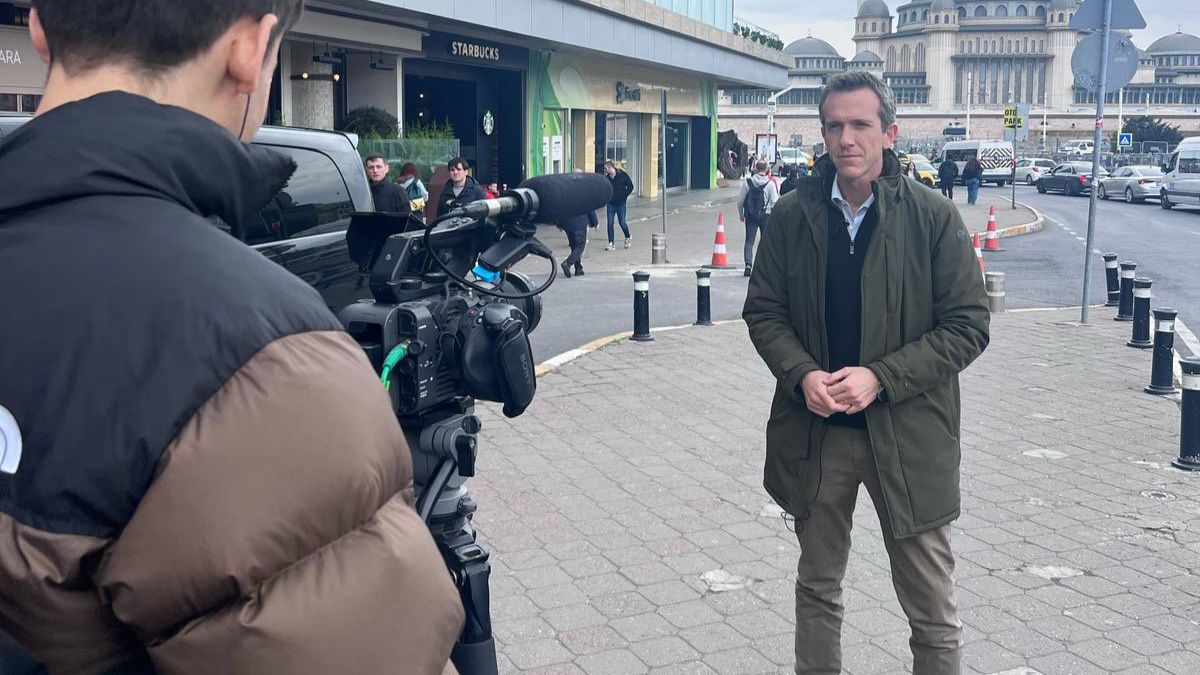BBC News correspondent Mark Lowen was arrested and subsequently deported from Turkey while reporting on nationwide protests sparked by the arrest of Istanbul’s mayor, Ekrem İmamoğlu.
Lowen, a seasoned journalist who previously lived in Turkey for five years, was taken from his hotel in Istanbul, detained for 17 hours, and then expelled from the country.
Authorities cited him as a “threat to public order,” an accusation that has drawn widespread criticism from press freedom advocates and human rights groups.
Almost 2,000 people detained since protests began
The protests in Turkey erupted following the detention of İmamoğlu, a key political rival to President Recep Tayyip Erdoğan. İmamoğlu, who serves as the mayor of Istanbul, was arrested on corruption and terrorism-related charges, which he denies.
His supporters argue that the charges are politically motivated and aimed at preventing him from challenging Erdoğan in the 2028 presidential election.
The arrest triggered some of Turkey’s most significant demonstrations in over a decade. Large crowds gathered outside Istanbul City Hall, with the opposition Republican People’s Party (CHP) leading rallies that reportedly drew hundreds of thousands of participants.
Smaller protests also took place in Ankara and other cities. Turkish police responded with force, using tear gas, rubber bullets, and water cannons to disperse demonstrators.
The government has accused protesters of inciting violence and violating national values. According to Interior Minister Ali Yerlikaya, at least 1,879 people have been detained since the protests began on March 19.
Turkey’s crackdown on the press
Lowen’s deportation has amplified concerns about press freedom in Turkey. His arrest and removal from the country are seen as part of a broader crackdown on journalists covering the protests.
The Turkish government maintains strict control over media outlets, and the state’s media regulator, the Radio and Television Supreme Council (RTÜK), has imposed a 10-day broadcast suspension on Sözcü TV, an opposition news channel.
Additionally, several other networks have been fined or ordered to halt specific programmes for their coverage of the unrest.
The BBC expressed strong disapproval of Lowen’s deportation, with News chief executive Deborah Turness calling it “extremely troubling.”
📣 Some news about me:
— Mark Lowen (@marklowen) March 27, 2025
Yesterday (Wednesday) I was detained by police in Istanbul, held for 17 hours and then deported from Turkey to the UK. Told I was “a threat to public order”. In the country I lived in - and love.
Journalism is not a crime.
Here’s the BBC’s statement: pic.twitter.com/vhw7BHlbnn
She stated the corporation’s commitment to impartial reporting, stating, “No journalist should face this kind of treatment simply for doing their job. We will continue to report impartially and fairly on events in Turkey.”
Lowen himself described the ordeal as “extremely distressing,” stating, “To be detained and deported from the country where I previously lived for five years and for which I have such affection has been extremely distressing. Press freedom and impartial reporting are fundamental to any democracy.”
A press freedom crisis in Turkey?
Turkey ranks 158th out of 180 countries in the World Press Freedom Index compiled by Reporters Without Borders (RSF). The organisation condemned Lowen’s expulsion, calling on Turkish authorities to cease targeting journalists.
RSF’s representative in Turkey, Erol Önderoğlu, stated, “This professional journalist and specialist on Turkey, where he lived for five years, was accused of being a ‘threat to public order’ for covering the protests in Istanbul.
RSF calls on the Turkish authorities to stop using the legal system to criminalise journalists and to lift the arbitrary bans on Mark Lowen and other foreign journalists’ entry into Turkish territory.”
Several other journalists covering the protests have also been detained. Agence France-Presse photographer Yasin Akgul was among those arrested and later released, though charges against him remain. Seven Turkish journalists who were jailed during the demonstrations are currently under investigation.
The Turkish government, however, has dismissed allegations that it is curbing press freedom. Justice Minister Yılmaz Tunç defended the handling of İmamoğlu’s case, asserting that the mayor’s arrest was based on serious charges and was not politically motivated.
“We absolutely reject any association of the probe with President Erdoğan and any political motives behind the investigation,” he stated. Tunç further justified the use of force against protesters, claiming that they were responsible for violence and attacks on law enforcement.
Meanwhile, Turkey’s Directorate of Communications stated that Lowen had entered the country without proper accreditation, leading to “administrative action.” The agency argued, “As a result, administrative action was taken against him. Unfounded claims aimed at manipulating public opinion should not be given credit.”
Turkey’s track record on press freedom has been widely criticised by international organisations.
Under laws passed in 2022, the government has expanded its control over online media, with social media platforms like Instagram, WhatsApp, and YouTube facing intermittent restrictions. Prominent accounts on X (formerly Twitter) have also been subject to censorship.
Human rights organisations and foreign governments have condemned Lowen’s expulsion, warning that Turkey’s treatment of journalists sets a dangerous precedent.
Emma Sinclair-Webb, the Turkey director at Human Rights Watch, remarked, “This sends a message to the rest of the international media that ‘we will not tolerate you covering stories we don’t want the world to see.’”
Beyond the political turmoil, Turkey’s financial markets have also reacted to the crisis. The lira plummeted following news of İmamoğlu’s arrest, forcing the central bank to intervene by spending an estimated $25 billion of its reserves to stabilise the currency.
Investors expressed concerns over the rule of law and the impact of political uncertainty on economic stability. While markets have shown signs of recovery following government assurances of continued economic reforms, uncertainty remains.
With inputs from agencies


)
)
)
)
)
)
)
)
)



